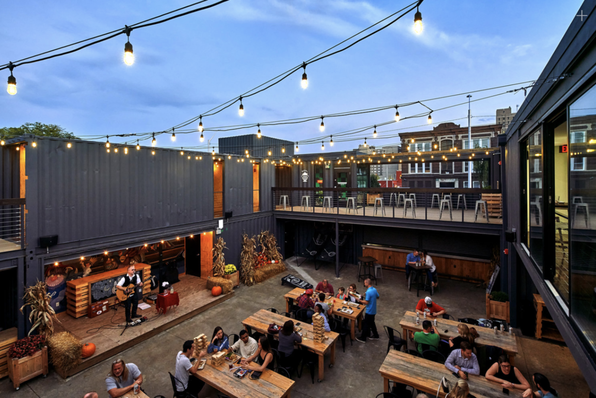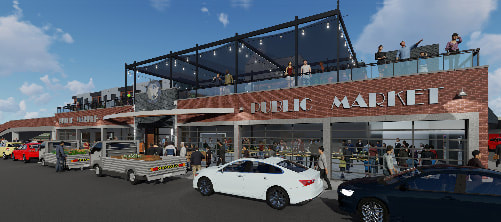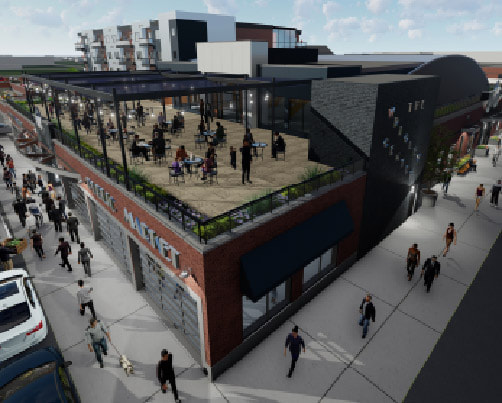The Evolution of Dining: Growing Popularity of Food Halls in Michigan
By: Jenna Swain

Food halls are taking the state of Michigan by storm, and for good reason. These innovative spaces bring together a variety of local food vendors, creating a unique and exciting dining experience for customers. Operators of these unique establishments and the individual restaurants that occupy them are seeing a whole new set of benefits compared to a traditional restaurant setting.
The growing popularity of food halls in Michigan can be attributed to a number of factors. For one, they offer an alternative and complimentary service to traditional restaurants. Food halls give customers the opportunity to try multiple vendors in one visit, providing a diverse selection of cuisines and ultimately, a more fulfilling dining experience.
The growing popularity of food halls in Michigan can be attributed to a number of factors. For one, they offer an alternative and complimentary service to traditional restaurants. Food halls give customers the opportunity to try multiple vendors in one visit, providing a diverse selection of cuisines and ultimately, a more fulfilling dining experience.

Additionally, food halls allow local vendors to reach a wider audience, giving them exposure and providing an opportunity for growth. The shared space also cuts down on overhead costs for operators and restauranters alike, making it easier for small-business owners to successfully operate their businesses.
From dish pits to cook lines, Jon Hartzell spent his high school and college years working in almost every sector of the restaurant industry in Royal Oak before opening his first food hall. He fell in love with restaurant life and the people of Detroit and was determined to leave his own special mark on the city.
“When I first decided to branch out, my only goal was to find a way to invest in the city of Detroit. My group wanted to be part of the growth of a stronger hub to help attract and retain talent in the area. Through our collective studies and exploration, we felt like a food hall made from shipping containers would be the most impactful, and thus, Detroit Shipping Company was born” Hartzell shares.
Detroit Shipping Company, located in Midtown Detroit, offers a variety of vendors, including Thai street food, pizza, sushi, and craft cocktails. Essentially, it is a marketplace of small businesses, which helps bring more traffic into the area.
This unique dining hall created a buzz that left the city hungry for more. Hartzell attributes his success in this area to the committed group of individuals who run the restaurants inside the venue, noting the importance of building strong relationships between tenants and operators to ensure all moving parts are in order.
“What you get out of this added effort is a tight family of collaborative caring operators all working toward a common goal; customer satisfaction. When people go out to eat, they want to be where others are. Food halls are relatively new venues and have a good amount of buzz, so they feel occupied and excited. Food halls will continue to pop up across Michigan as efficiencies in shared space will continue to increase as we hewn in on the effort."
Food halls provide a forum for businesses to collaborate and innovate, which can help drive growth and success in a competitive industry.
From dish pits to cook lines, Jon Hartzell spent his high school and college years working in almost every sector of the restaurant industry in Royal Oak before opening his first food hall. He fell in love with restaurant life and the people of Detroit and was determined to leave his own special mark on the city.
“When I first decided to branch out, my only goal was to find a way to invest in the city of Detroit. My group wanted to be part of the growth of a stronger hub to help attract and retain talent in the area. Through our collective studies and exploration, we felt like a food hall made from shipping containers would be the most impactful, and thus, Detroit Shipping Company was born” Hartzell shares.
Detroit Shipping Company, located in Midtown Detroit, offers a variety of vendors, including Thai street food, pizza, sushi, and craft cocktails. Essentially, it is a marketplace of small businesses, which helps bring more traffic into the area.
This unique dining hall created a buzz that left the city hungry for more. Hartzell attributes his success in this area to the committed group of individuals who run the restaurants inside the venue, noting the importance of building strong relationships between tenants and operators to ensure all moving parts are in order.
“What you get out of this added effort is a tight family of collaborative caring operators all working toward a common goal; customer satisfaction. When people go out to eat, they want to be where others are. Food halls are relatively new venues and have a good amount of buzz, so they feel occupied and excited. Food halls will continue to pop up across Michigan as efficiencies in shared space will continue to increase as we hewn in on the effort."
Food halls provide a forum for businesses to collaborate and innovate, which can help drive growth and success in a competitive industry.

Following this growing trend, Wrigley Hall in Port Huron is set to open its doors later this month. Wrigley Hall is a multifaceted Food Hall & Entertainment Venue that combines the best sights, sounds, and flavors of the Blue Water community together under one roof. Connected to greater than 30,000 sq ft. of retail, the space delivers over 60,000 sq ft. of entertainment, dining, & retail experiences for patrons.
Wrigley Hall Owner, Daniel Dooley, shares some of the benefits these kinds of establishments provide from an operational standpoint.
“There are several key differences from traditional sit-down restaurant models that result in the following benefits for operators: unique and ‘community focused' customer experiences, lower overall operating costs, and lower barrier to entry for culinary entrepreneurs seeking to bring new food and beverage concepts to the market.”
Wrigley Hall Owner, Daniel Dooley, shares some of the benefits these kinds of establishments provide from an operational standpoint.
“There are several key differences from traditional sit-down restaurant models that result in the following benefits for operators: unique and ‘community focused' customer experiences, lower overall operating costs, and lower barrier to entry for culinary entrepreneurs seeking to bring new food and beverage concepts to the market.”

Dooley continues, comparing operating differences between food halls and traditional restaurants:
Overall, food halls are becoming a premier destination for foodies and casual diners alike, and their popularity shows no signs of slowing down. Not only do they benefit customers looking for new dining experiences, but they also offer opportunities for growth and innovation for local small-business owners. So, regardless of which corner of the mitten state you're in, be sure to check out one of Michigan’s many food halls for a unique and delicious dining experience.
- The physical footprint of food halls is typically larger and set to encourage socialization and customer movement. Food halls enable consumers to move freely throughout the space and sit in larger congregating areas.
- Due to more consumer-directed service, there is no need to hire wait staff, so it cuts down on overall labor costs. Operating expenses are also reduced as shared kitchen spaces are utilized. This allows food halls to take more economic risks such as supporting local culinary start-ups, investing in customer activities and entertainment, etc.
- Most food halls provide all the necessary equipment and overhead items for new entrepreneurs to quickly begin serving customers. The ‘red tape’ related to licensing, insurance, and IT set-up is handled for them reducing the barriers to entry. They can focus on what they do best - serving customers - and let the food hall management take care of the rest.
Overall, food halls are becoming a premier destination for foodies and casual diners alike, and their popularity shows no signs of slowing down. Not only do they benefit customers looking for new dining experiences, but they also offer opportunities for growth and innovation for local small-business owners. So, regardless of which corner of the mitten state you're in, be sure to check out one of Michigan’s many food halls for a unique and delicious dining experience.




